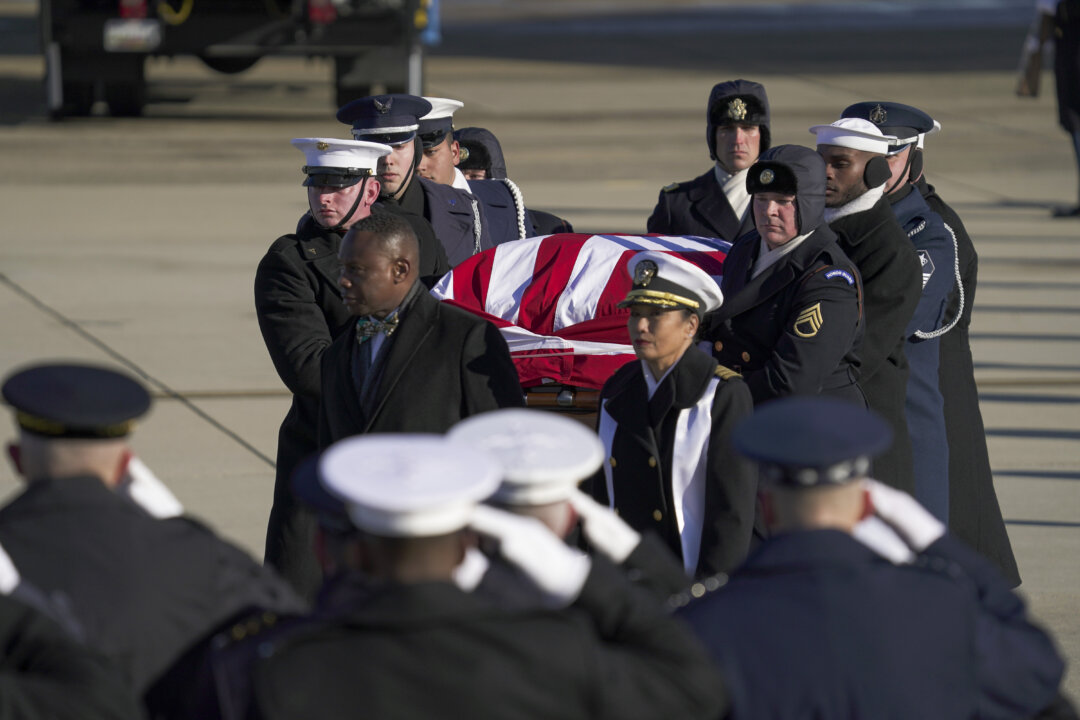The former president will be the 46th person to lie in state or honor in the Capitol.
Former President Jimmy Carter will lie in state at the U.S. Capitol this week, joining an exclusive list of those who have had the distinct and rare honor.
His coffin will be brought to the Rotunda at the Capitol. After the horse-drawn carriage arrives at the steps to the Rotunda, where he will lie in state, members of the military will carefully carry the coffin up those steps. A private ceremony inside the Rotunda begins at 4:30 p.m. ET.
The casket will be placed at the center of the Rotunda, which is in between the House and Senate sides of the Capitol. The round-shaped area consists of iconic paintings such as the signing of the Declaration of Independence, the British surrendering in the Revolutionary War, and George Washington resigning his military commission.
Speeches will be given to commemorate the 39th president, who died on Dec. 29 at the age of 100. The congressional tribute will be given by House Speaker Mike Johnson (R-La.) and Senate Majority Leader John Thune (R-S.D.), according to Johnson’s office.
“The physical lying in state part is typically quiet and somber,” Joshua Kennedy, a political science professor at Georgia Southern University, which is in Carter’s home state, told The Epoch Times.
“Speeches and things of that nature are typically reserved for the funeral itself,” he continued. “But based on the coverage, we are likely to hear a great deal about former President Carter’s life, both in and out of the White House, as well as his devotion to his wife and family and the work he took up upon leaving the White House in 1981.”
After the ceremony, the coffin will be available for viewing by members of the public between 7:30 p.m. to 12 a.m. ET on Jan. 7, and 7 to 12 a.m. on Jan. 8.
The coffin will leave the Capitol on Jan. 9 for the funeral at the National Cathedral in Washington.
The last elected leader to lie in state in the Capitol was former Rep. Don Young (R-Alaska), who was the longest-serving Republican member of Congress.
The last person to have the honor to lie in honor or state was Korean War veteran Ralph Puckett Jr., whose cremated remains were at the center of the Rotunda last year.
Lying in state is different than lying in honor, as the former is typically for those who were elected to office, while the latter is usually for those who provided distinguished service to the nation.
“Prominence, widely recognize importance, and family wishes seem to dictate the practice, for which there are not written rules,” Steven Smith, a political science professor emeritus at Washington University in St. Louis, told The Epoch Times.
Overall, Carter will be the 46th person to lie in state or honor in the Capitol. The first to lie in state was Henry Clay—who served as a senator, speaker, and Secretary of State—in 1852.
“Lying in state is considered a great honor for former government officials, and it is a routine practice for deceased presidents,” said Kennedy.
After all, he said, “as the Capitol is the center of government in the United States, and because it is much more accommodating to visitors given size constraints, presidents lying in state there fits well with tradition.”
Coffins lying in state at the Rotunda have presented standout moments.
One was on Dec. 4, 2018, when former Senate Majority Leader Bob Dole (R-Kan.), at the age of 95, rose from his wheelchair to salute the casket of former President George H.W. Bush—a powerful gesture as the two were political rivals despite both being Republicans. Dole died a few years later and laid in state at the Capitol on Dec. 9, 2021.
Another moment was in June 2004 when former First Lady Nancy Reagan touched and kissed the coffin of her husband, former President Ronald Reagan.
A person lying in state or honor requires a concurrent resolution to be passed by both the House and Senate. This is done with little fanfare even with the deceased being the subject of political controversy.
“While we do live in very polarized, partisan times, Congress does manage to get more routine business done regularly, though this is not what attracts attention as it is usually uncontroversial,” said Kennedy.
“The notion of a former president lying in state is one with a long history, and I cannot conceive of how it would benefit any party collectively to attempt to prevent it.”

